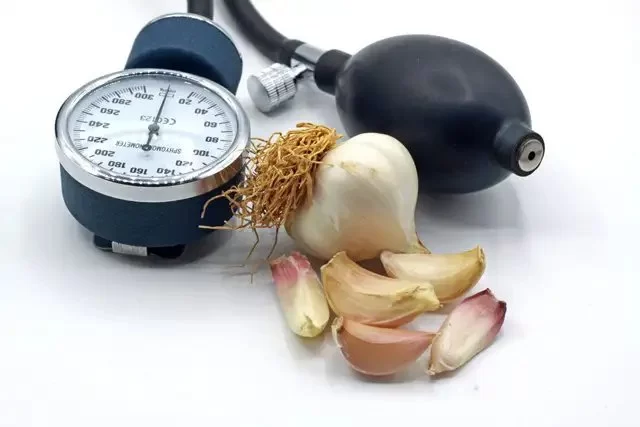The Benefits of Garlic for Cholesterol and Blood Pressure
1. The Power of Garlic: A Natural Remedy for Heart Health
Garlic has long been regarded as a powerful superfood, packed with numerous health benefits, particularly when it comes to heart health. From ancient remedies to modern-day nutrition, garlic has stood the test of time as an effective solution for various ailments. One of its most significant benefits is its ability to manage cholesterol levels and blood pressure, making it a valuable ally in the prevention and management of cardiovascular diseases.
In this article, we’ll dive deep into the science behind garlic’s effectiveness in improving heart health, explore the specific benefits it offers for cholesterol and blood pressure, and share practical tips on how to incorporate garlic into your diet for better cardiovascular well-being.

2. Garlic and Cholesterol: A Heart-Healthy Connection
High cholesterol is a major risk factor for heart disease, contributing to the buildup of plaque in the arteries. Garlic, particularly its active compound allicin, has been shown to have a positive impact on cholesterol levels. Studies have suggested that garlic can lower total cholesterol, LDL (low-density lipoprotein) or "bad" cholesterol, and triglycerides, while maintaining or even improving HDL (high-density lipoprotein) or "good" cholesterol levels.
Allicin works by inhibiting the enzymes responsible for cholesterol production in the liver, leading to a reduction in the overall cholesterol levels in the bloodstream. Additionally, garlic is known to improve the overall health of the blood vessels, making it easier for blood to flow freely without obstruction.
2.1 How Garlic Lowers LDL Cholesterol
Several studies have demonstrated that garlic supplementation can lead to a reduction in LDL cholesterol, a substance that contributes to the formation of plaque in the arteries. By reducing LDL cholesterol, garlic helps prevent the hardening and narrowing of the arteries, a condition known as atherosclerosis, which can lead to heart attacks and strokes.
One notable study found that individuals who consumed garlic regularly experienced a significant decrease in LDL cholesterol levels, as well as a reduction in total cholesterol. These findings have sparked interest in incorporating garlic into heart-healthy diets, particularly for those at risk of cardiovascular issues.
3. Garlic and Blood Pressure: A Natural Solution for Hypertension
Hypertension, or high blood pressure, is another major risk factor for cardiovascular diseases, including heart attack, stroke, and kidney failure. Fortunately, garlic has shown promising results in managing blood pressure levels. Garlic’s ability to help lower blood pressure can be attributed to its ability to relax blood vessels and improve circulation.
Studies have demonstrated that garlic supplementation can help reduce both systolic and diastolic blood pressure, making it a natural alternative to traditional antihypertensive medications. The blood pressure-lowering effects of garlic are believed to be due to its ability to increase nitric oxide production, which helps dilate blood vessels and improve blood flow.
3.1 Garlic's Effect on Systolic and Diastolic Pressure
Research has shown that garlic can be especially beneficial for individuals with high blood pressure. A systematic review of multiple studies found that garlic supplementation resulted in an average reduction of 8–12 mmHg in systolic blood pressure and 5–9 mmHg in diastolic blood pressure in hypertensive individuals.
These results suggest that adding garlic to the diet can be an effective way to support blood pressure regulation, especially when combined with other lifestyle changes such as a balanced diet, regular exercise, and stress management.
4. How to Incorporate Garlic into Your Diet
Now that we know garlic can help manage cholesterol and blood pressure, the next step is figuring out how to incorporate it into your daily routine. Fortunately, garlic is versatile and can be added to various dishes to enhance both flavor and health benefits.
4.1 Fresh Garlic vs. Garlic Supplements
The most effective way to reap the benefits of garlic for heart health is by consuming it in its natural form. Fresh garlic cloves contain the active compound allicin, which is responsible for its cholesterol- and blood pressure-lowering effects. Simply crush or chop fresh garlic and let it sit for a few minutes to activate the allicin before adding it to your meals.
Garlic supplements are also available, typically in the form of garlic powder or aged garlic extract. While supplements can offer convenience, fresh garlic is generally recommended for maximum potency and effectiveness.
4.2 Delicious Ways to Add Garlic to Your Meals
There are countless ways to enjoy garlic in your diet. You can add it to salads, soups, roasted vegetables, stir-fries, pasta sauces, and even smoothies. Garlic pairs well with a wide range of flavors, from herbs and spices to meats and plant-based options, making it a versatile ingredient in many cuisines.
Try roasting whole garlic bulbs for a sweet, mild flavor that can be spread on toast, mixed into mashed potatoes, or added to soups. For a quick and easy option, sauté minced garlic in olive oil and drizzle over cooked vegetables or grains for a flavorful and heart-healthy side dish.
5. Other Heart-Healthy Benefits of Garlic
In addition to its cholesterol- and blood pressure-lowering effects, garlic has been shown to offer several other heart-healthy benefits. These include reducing inflammation, improving blood vessel function, and reducing the risk of blood clots.
Garlic’s anti-inflammatory properties help reduce oxidative stress and inflammation in the body, both of which are linked to heart disease. By lowering inflammation and improving blood vessel elasticity, garlic helps maintain a healthy cardiovascular system over time.
6. Conclusion: Garlic as a Heart-Healthy Superfood
Garlic is more than just a flavorful addition to your meals—it's a powerful natural remedy for managing cholesterol and blood pressure, both of which are key factors in maintaining heart health. By incorporating garlic into your daily diet, you can take proactive steps toward better cardiovascular health.
If you're looking for heart-healthy products and advice, visit HeartCare Hub, where we provide the best resources and recommendations for maintaining a healthy heart.






















Daniel M. Sauri, MD
blood pressure 136/56
800 Biesterfield Rd, Elk Grove Village, IL 60007, USA